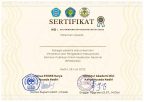Empowerment of Cadres in Preventing the Risk of Mental Health Problems Due to Disasters in Vulnerable Groups on the Slopes of Mount Kelud
Keywords:
Empowerment, Cadres, Disaster, Mental HealthAbstract
The potential eruption disaster on Mount Kelud needs to be considered at all times considering its impact on various things including the occurrence of health problems. In addition to physical health problems, such as respiratory disorders, vision, and physical injuries, which can befall residents, especially on the slopes of Kelud, mental health problems are also not uncommon among residents affected by volcanic eruptions. One group that is vulnerable to mental health problems is the elderly, children, and pregnant women. Therefore, prevention efforts are needed so that these groups do not experience various mental health problems such as acute stress reactions, anxiety, depression, post-traumatic stress disorder, and other exacerbations that arise as a direct result of disasters and other health problems. This is very likely to happen considering that one of the characteristics of disasters is that they are sudden, difficult to predict with certainty, have a large impact of damage, risk of death, cover a large area, and threaten the capacity of the local community. One of the efforts to minimize the impact of these disasters on the emergence of mental health problems is the empowerment of health cadres to increase community capacity in overcoming mental health problems in local vulnerable groups. The empowerment of cadres in this activity is carried out through educational activities about the risk of mental health problems that occur in the elderly, pregnant women, and children. Abstract In addition, stress management techniques were also delivered through lectures demonstrations, and video screenings on stress management. This activity was attended by 40 elderly cadres, toddler cadres mental health cadres, and representatives of village officials. Participants followed the activity enthusiastically, by being actively involved in discussions and questions and answers related to how to make efforts to deal with mental health problems in the elderly, children, adolescents, pregnant women, breastfeeding mothers, and the community in general. Participants also claimed to be satisfied and wanted to be actively involved in this activity in the future, especially in carrying out the duties and functions of cadres in recognizing mental health problems, mobilizing the community, making referrals, and documenting their performance. This activity can be recommended to increase the capacity of cadres to overcome mental health problems caused by disasters.
Downloads
Published
Issue
Section
License
Copyright (c) 2024 Proceedings of the National Health Scientific Publication Seminar

This work is licensed under a Creative Commons Attribution 4.0 International License.







